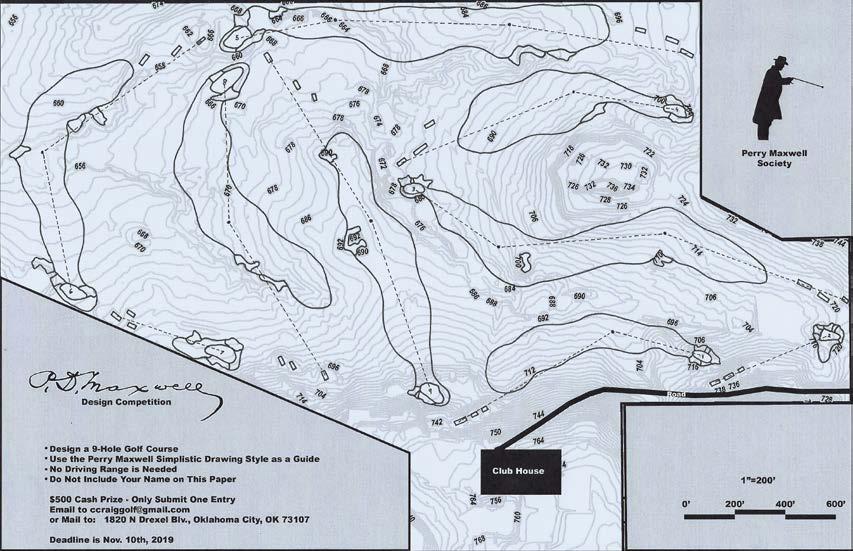
10 minute read
Perry Maxwell design contest takes off
A young Oklahoman course architect devoted to Perry Maxwell creates a design competition he hopes will stimulate interest in his designs, many of which grace Oklahoma
golf course architect who won the 2015 Golfclubatlas. com design competition with an imaginative 5,598- yard, par-69 layout.
Advertisement
Craig has long felt the most important aspect of a design, and that which distinguishes the great designers, is the by that initial encounter at Southern Hills, grew unchecked. His dedication reached such a level in fact, that in February of last year, one month after leaving Davis’s firm and setting up his own, he formed the Perry Maxwell Society with the intention of promoting Maxwell’s work, seeking opportunities to renovate and revive his courses, holding special events, and one day purchasing his home in Tulsa to create a “Maxwell Clubhouse” housing a museum and an Airbnb for enthusiasts.
“We had our first (special event) in June
by tony dear

What golfer doesn’t design golf holes in his mind from the safety of his armchair? Most of the time we dream up these calendar-worthy holes with no thought to the practicalities of actually building them – budget, drainage, grade, setting sun, prevailing wind, sequencing, etc. But so what, they’d look great on the cover of a magazine.
A few really devoted amateur designers do consider the realities of design and commit their fictional holes to paper, even entering them in design competitions, the best-known of which is probably the Ray Haddock Lido contest, named for Alister MacKenzie’s great-grandson and awarded each year by the Alister MacKenzie Society. The Lido competition began in 1998, three years after Haddock discovered MacKenzie’s “lost manuscript” and published it as “The Spirit of St. Andrews.” The name “Lido” comes from the long lost golf course on Long Island, N.Y., for which Mackenzie designed a stunning par-4 hole in a 1914 design competition sponsored by Britain’s “Country Life” magazine.
Last year, the Lido called for the design of a single par-4 hole. Though he certainly respects the competition, it is this stipulation that bothers Colton Craig.
“I’ve been frustrated by the Lido to be honest,” said the 2 6 - y e a r- o l d O k l a h o m a C i t y - b a s e d quality of the routing.
A graduate of Oklahoma State where he studied Landscape Architecture, Craig began his career in golf during high school summers caddying and working on the maintenance crew at Southern Hills in Tulsa. During college, he interned with course architects Richard Mandell, Jerry Slack, and Bill Bergin, and, following graduation, he joined Tripp Davis as a design associate, remaining in Norman for three years.
All the while, his fondness and affection for Perry Duke Maxwell designs, fueled obviously at Dornick Hills, his first design,” Craig said. “The first nine there was completed in 1919 so it was a fun centennial celebration. Maxwell’s grave sits above the 7th hole and we all took a photo together there before we played the course. Twenty-five people from all over the country attended.”
In August, Craig announced the Perry Maxwell Design Competition, which, instead of one hole, would require participants to design a nine-hole layout on a topographical map using Maxwell’s “simplistic drawing style as a guide.”
Not many people knew it, but the site was actually the eastern half of Southern Hills with elevations ranging from 656- to-768 feet. The contours surrounding the clubhouse were steep, but otherwise were fairly gentle and there was little in the way of dramatic features.
The contest attracted 60 entries from Colton Craig Reid Turner's winning routing design . . .
around the world.
“We even received designs from 8- and12-year-olds,” said Craig, who has visited every surviving Maxwell design (53 courses from an estimated 70) and said Old Town Club in Winston-Salem, N.C., is probably his favorite.
“We obviously preferred designs we felt Maxwell would have approved of. November 15th was the closing date – the 67th anniversary of his passing,” Craig said.
The winner of the $500 first prize was 28-year-old Reid Turner, an Australian currently doing shaping work for Ogilvy, Cocking and Mead (OCM). Turner said he’s been drawing golf holes since he was 5.
“I’ve always loved it and certainly hope to become a designer myself one day,” Turner said. “We don’t have any Maxwell courses in Australia, so I’m actually more of an Alister MacKenzie fan. His bunkering and green complexes were amazing – we saw just how good they are during the Presidents Cup at Royal Melbourne, my favorite course.”
Among contemporary designers, Turner most admires Tom Doak, whose visual challenges he regards as exceptional.
Turner estimates it took two months of edits, updates, and rethinks, to arrive at his final design after taping the site map to his desk and covering it with a roll of baking paper upon which he drew tee and green sites with a sharpie.
Judging by the photographs and routings Turner had seen, that meant keeping it simple with minimal bunkers and tees close to greens.
To judge the contest, Craig selected course architects Trey Kemp and Andy Staples, the first two designers to join the Perry Maxwell Reid Turner
2020 GOLF PASS
Applicable c art fees apply
GREAT COURSES 94
DISCOUNTED ROUNDS At top courses in: 90 Oklahoma Arkansas S. Kansas $ 49 95 Only FREE or
Call 918.357.3332 for bulk pricing or to order. www.SCSPGAGOLFPASS.com ORDER YOURS TODAY AT: We accept all major credit cards

124 N Peoria Ave Tulsa, OK 74120 918.832.5544
www.jonesplan.com

BUILDER
Society. Both picked Turner’s entry as the best, highlighting the proximity of tees to greens and the unadorned, unfussy routing. “I chose the design that came closest to reflecting what Maxwell actually did on the property,” said Staples, principal at Staples Golf which not only co-created the incredible Championship and Links courses at Sand Hollow in Utah, but also pioneered the concept of Community Links and is currently involved in renovation work at former U.S. Open venue Olympia Fields outside Chicago, and PGA National in Florida. “It came as close as anything to laying out holes that Maxwell actually built.”
Kemp, a course architect at Colligan Golf Design in Arlington, Texas, was all about restraint. “Maxwell designed many low-budget courses where he couldn’t move a lot of dirt or build a lot of bunkers,” Kemp said. “The natural character of the land had to be the course’s primary defense. So I’d say restraint was my biggest key for success.”
Besides that though, Kemp singled out Turner’s design for its walkability and fun factor. “I just thought it would be a lot of fun to play for all levels of golfers,” Kemp said. “It flowed nicely over the entire property and used the topography well. And something else I liked, though I’m not sure it was intended, was that after the 5th hole you could go right to the 9th tee to make a great sixhole loop.”
Craig considers the first Perry Maxwell Design Competition a great success and adds that Nov. 15 will be the closing date every year. He has plans to expand the contest into three sections – Amateur, Aspiring, and Actual. That will give amateurs like me (see sidebar) a little hope as going up against those already involved in the design business in some capacity or other, and whose layouts “accurately reflect what Maxwell would have done,” is a tall order.
Ultimately, of course, who wins and how flawed my entry is doesn’t matter in the slightest. What does is that the work of one of golf’s most astute and sensible, but underrated, designers gets the attention it unquestionably deserves.
So, how bad was my entry? “The first turnoff was the use of the obvious pond in the topo on the eastern side of the site,” says Staples, referring to a strangely bare, white, contour-free patch in the bottom right of the map that, on close inspection, was clearly a water feature of some kind but which I’d chosen to use as the green site for the 1st hole. Apparently, I wasn’t the only one to make this mistake, but knowing there are similarly dimwitted folk out there isn’t actually that comforting. “The greens were way too big as well,” Staples said. “They were totally out of scale, unless that was something you were going for.” It wasn’t. I devoted slightly more than 99.99 percent of my time to the routing, trying to create variety and interest with holes enjoying different views and playing into different winds. Layouts with a lot of parallel holes are often bland with little appeal, but in trying to avoid this I’d not given much (any?) thought to the size of my greens which, Craig told me, averaged about 40,000 square feet. “And a couple of the fairways were about 150 yards wide,” Kemp added.
That’s hilarious, but it did give me a little insight into the multiple elements architects have to think about when designing a course. They don’t just turn up, mark out excitinglooking holes then leave. Designing an enjoyable course that functions properly takes a great deal of planning and expertise. “I also think you pushed the holes too close to the property lines,” Staples said. “That may not have been a significant issue in Maxwell’s day, but it’s certainly something I look at today. Your holes also played right over some of the drainage patterns which would not only eliminate some of the most natural features on the property, but also contradict Maxwell’s philosophy.”
Kemp wasn’t a fan of the first two holes being sharp dogleg-right holes. “And I think the proximity of the 4th green and 7th tee to the 9th fairway would create some safety issues,” he said.
Not great then. To be fair though, both Staples and Kemp did offer some encouragement. “I thought it had a unique look, and might be a course I’d be interested in checking out,” Staples said.
Kemp added, “The best thing was the variety of hole directions and use of the entire site. Overall, I thought you did a good job, and if your course got built I think it would be fun to play.”
Like the one good shot a round you need to ensure your continued participation, those small bones Staples and Kemp threw me guarantee I’ll be entering next year.
Tony Dear is an award-winning golf writer (if not designer) and frequent contributor to Links Magazine. He is based in the state of Washington. Southern Hills is regarded as one of Maxwell's finest designs. The author's routing, creative but 40,000-foot greens a bit much.


B E N E F I T S Corporate SourceFor YourSingle



405.359.0594 www.nfp.com/csok
THE RIGHT CORPORATE AND EMPLOYEE BENEFITS STRATEGY IS THE ONE THAT’S RIGHT FOR YOU AND YOUR COMPANY.











